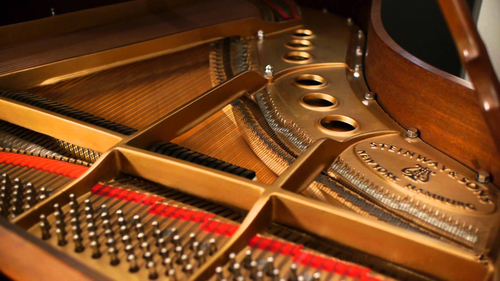Adults
| |
Why would I start now?


"It's too late now. I wish I started when I was a kid. It would have been easier."
Piano teachers hear this all the time from prospective (and sometimes current) adult students. Many people assume that because they never took lessons as a child, then it is too late to start as an adult. Or perhaps they had a bad experience with piano lessons as children and quit, only to regret it later on.
The benefits of having music in your life as an adult student are many and it is never too late to start reaping them. Most professional musicians began their formal training before age 10, but if your interests are for personal enjoyment and recreation then by no means is it ever too late. In fact, adult students have a number of advantages in learning piano compared to children.
| |
Advantages of Adult Piano Lessons:
Adults take lessons of their own volition.
Children, on the other hand, often need to be persuaded and cajoled to practise and attend lessons -- even if they really do have a natural interest in piano. Adults who take lessons are typically very dedicated and committed students. No kicking and screaming when it comes to home practice or going to the lesson for adult students.
Adults can understand and absorb complex concepts much more easily.
This makes learning music theory and analysis much easier than it is for children, and it has direct implications for interpreting and performing music.
Many people believe that making music is a purely creative, right-brained activity but it engages several different areas across the entire brain at the same time. (This is what makes it an excellent way of keeping mature brains active and healthy.) As one of the most emotionally charged art forms, music would be very dull and uninteresting without creative and emotional flair. However, so much of interpretation and performance rests on a foundation of understanding music theory and analysis. Of understanding musical vocabulary and structure, as well as the composer's intent and direction with musical material. Playing music without understanding these elements would be like an actor reciting poetry without understanding the meaning of the words or basic grammar.
Adults have longer attention spans.
Children's attention spans are generally much shorter, often just a few minutes at a time. It requires a high level of concentration and focus to learn piano so adults have the advantage on this one. Progress at the piano is the result of many hours of careful practice with great depth of focus.
(Incidentally, practising without concentrating is not just unproductive; it can be very counterproductive. Sloppy practice can lead to bad habits or misplaying that requires more time and effort to unlearn and then re-learn properly.)
Adults are fully literate and numerate.
By contrast, children (especially very young ones) may be still in the process of getting a firm handle on their letters and numbers so this necessitates more basic teaching methods. Note names, fingering numbers, counting the rhythm and musical instructions require facility in reading letters and numbers without getting confused or mixed up. So do music theory, music history as well as analysis.
Adults are fully grown, physically speaking.
Children have developing skeletons and muscles. Fully formed hands as well as coordinated hands and feet are a major advantage at the piano by making a wider range of music accessible. Children learning string instruments must adapt to different sized instruments as they grow. The violin, for example, comes in eight different sizes to suit players of different sizes. The piano is a one-size-fits-all instrument. Having adult-sized hands makes it easier.
Remember: It is never too late to start. If you are an adult wishing to begin or resume, there is no time like the present. Taking lessons as an adult could be a path to musical satisfaction and fulfillment.
| |
Personal Reasons
Adult students come to us for lessons because they:
Took lessons as a child and wish to continue where they left off
Want to relieve stress by doing something fun and creative
Never had the chance to take lessons before, but always wanted to learn to play piano
Would like to play music with family / friends who sing or play other instruments
Already sing or play another instrument and wish to play piano as well
Work in a preschool / daycare / elementary school and being able to play piano helps in the classroom
Retired and want a hobby
Had a difficult life event and want to do something for themselves
Want to explore different music styles or genres
Want to improve self-confidence and patience
Want to become comfortable in front of an audience when performing or public-speaking
Want to be a more interesting person
Want to maintain or enhance mental sharpness, memory, brain function
Want to achieve certain personal goals (learning how to play their own or someone else's favorite song, connecting with others who enjoy music)
